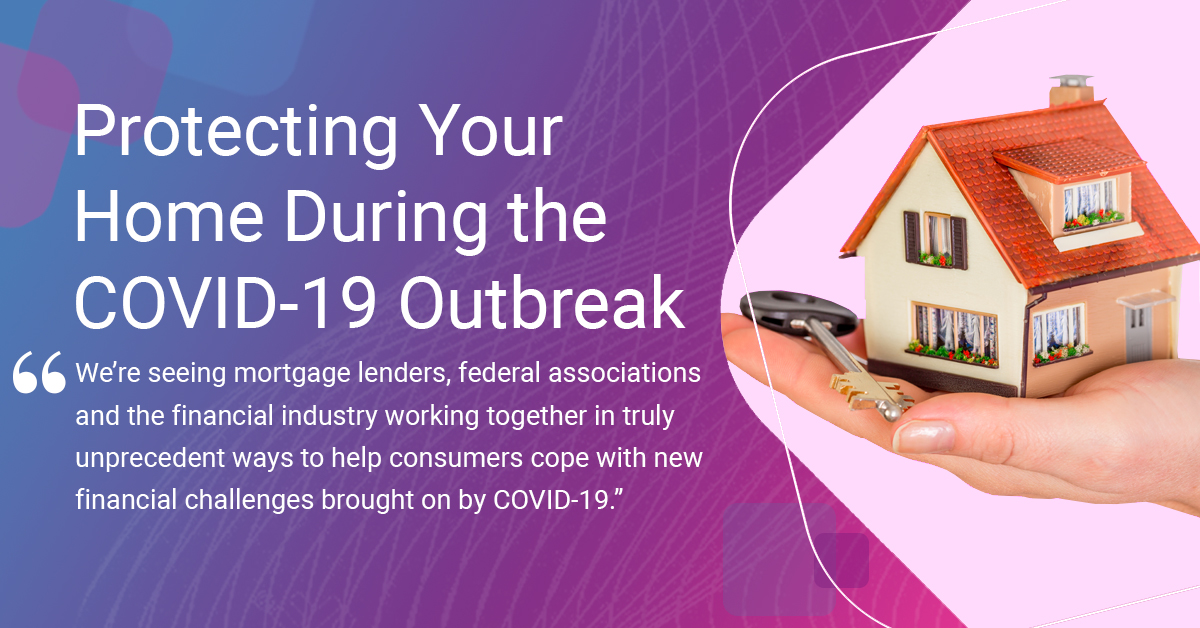Whether due to job loss, shortened working hours, or the need to take off time from work to care for ill family members, the current COVID-19 outbreak will undoubtedly cause financial hardship for millions of Americans. Understandably, the current situation is causing some consumers to fear losing something they’ve worked incredibly hard for – their home.
For many, a home is the largest purchase they’ll ever make. We spend many years of our lives working to purchase a home and then many years after working to fill it with memories.
We understand how important it is for you to protect your home. Thankfully, we’re seeing mortgage lenders, federal associations and the financial industry working together in truly unprecedented ways to help consumers cope with new financial challenges brought on by COVID-19.
Last week, the Department of Housing and Urban Development, Fannie Mae and Freddie Mac — two of the largest mortgage services in the county — announced they are suspending foreclosures and evictions for at least 60 days. You can read more about this announcement here.
This was followed by New York, an area hit particularly hard by COVID-19, urging mortgage servicers to refrain from reporting late payments for 90 days. The order outlines ways lenders can provide support to consumers who are unable to make timely mortgage payments, including forbearing mortgage payments for 90 days from their due dates. As part of this, late payments would not be reported to credit reporting agencies like Experian for 90 days and consumers would not have to pay late or online payment fees. The order also postpones foreclosures and evictions for 90 days and requires lenders to proactively outreach to consumers, through text, email or other means to ensure they’re aware of the assistance that’s being offered. Los Angeles, Miami and other cities across the U.S. are now also halting evictions.
This news was shared in conjunction with Bank of America announcing additional support to borrowers, including the option to defer, or essentially pause, mortgage payments during the current outbreak. Many of the largest mortgage lenders in the country are offering the same support to consumers. Please note, the Department of Housing and Urban Development, Fannie Mae and Freddie Mac acted fast, and these are the guidelines as of the time when this article was written. As things are still early, our Experian mortgage team will stay abreast with potential new developments and update this information if or as things will change.
These are unprecedented times and we are starting to see lenders and consumers engage in equally unprecedented ways as we work to overcome the new reality we’re all facing.
At the same time, we are seeing interesting trends unfold in terms of mortgage lending activity. According to the Mortgage Bankers Association, as of March 25, 2020, these include:
- Refinancing existing mortgages, which has been booming with interest rates at historically low levels, declined almost 35% compared to the previous week, but is still twice as high as it was the previous year.
- Not surprisingly, the states with the biggest declines are the states hardest hit by the COVID-19 outbreak (i.e. New York, Washington, and California)
- In addition, with the economy under pressure, there was a nearly 30% decline in weekly new mortgage applications.
If you or someone you know is a homeowner, I hope you found this information useful. Remember, if you are concerned you may miss a mortgage payment, the first and best move you can make, to protect your home and your financial health, is to contact your mortgage lender as soon as possible. Lenders do not want you to miss a payment any more than you do. They can discuss options for navigating these unusual circumstances.
Keep in mind, these programs are available to you if you are facing financial hardship due to the COVID-19 crisis, for example, if you lost your job or had to be hospitalized. Of course, we’re all hoping not to be in either of these categories. If you haven’t been financially impacted by the current COVID-19 crisis, you are expected to continue to make your mortgage payments (and meet all your other financial obligations).
You should feel good about being able to do that as it will make you part of the important group of individuals who can keep contributing to sustaining the American economy.
